Engender blog
Free International Women’s Day Print
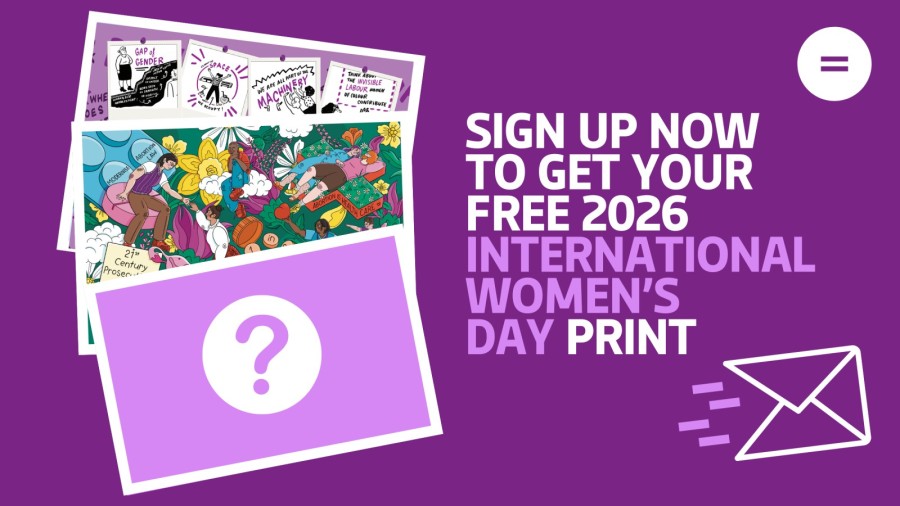
Our Free Feminist Artwork is back for 2026!
We’ve got a treat for Engender members and supporters this International Women’s Day.
We’ve got a limited number of stunning A6 prints available for Engender members and supporters to claim, created by incredible local illustrator, Heedayah Lockman.
We’ve got 250 prints to give away to Engender members, and another 100 up for grabs, so be quick to secure this excellent addition to your feminist art collection.
How to claim yours
It couldn’t be easier - just complete the form below with your details, and we’ll pop one in the post!
Please fill in the details below to receive your free A6 Print.
Fields marked with a * are required.
A step forward for women’s equality as two-child limit set to be scrapped
After almost a decade of campaigning by Engender and other women’s and equalities groups, the UK Government has announced that the two-child limit will be scrapped from April 2026.
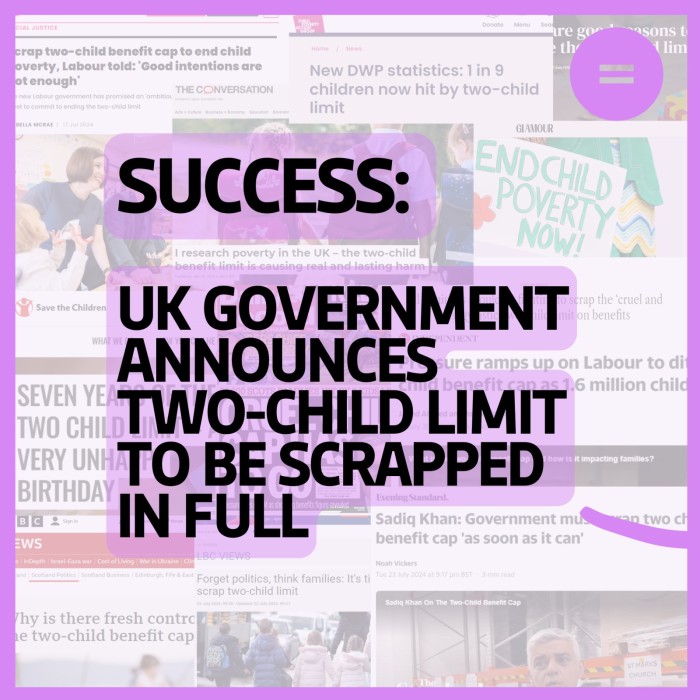
Over 8 years after it was first introduced, the Chancellor announced in the UK’s Autumn 2025 Budget that the two-child limit will finally be scrapped from April 2026. This long-overdue commitment is a victory for equality campaigners, activists and the women and families who have borne the profound harms of this cruel policy since its introduction.
The two-child limit currently restricts support from Universal Credit to two children in a family, leaving women and their families without means-tested support for subsequent children. It also includes the barbaric ‘rape clause’, an exemption to the limit where a pregnancy can be shown to have resulted from rape. This forces women to disclose traumatic experiences at a time and in circumstances not of their choosing, to avoid or minimise poverty for themselves and their children.
Organisations have long called for change
Since the limit was introduced in 2017, Engender and other women’s, anti-poverty and equalities organisations have been calling for it to be removed. We have consistently highlighted how the policy systematically discriminates against women, forcing them to justify their reproductive choices and disclose traumatic experiences to access basic social security. The policy is also internationally recognised to be a form of sexist discrimination in social security design, with the United Nations CEDAW Committee recommending it be repealed in its most recent examination of the UK in 2021.
Evidence has consistently shown the devastating impact of the two-child limit: one in nine children across the UK are affected; thousands of women are required to report their rape to secure an exemption; and families in every local authority area in Scotland are being pushed into deeper poverty. It has a hugely disproportionate impact on women. The most recent figures indicate that over half (54%) of households affected are single-parent households, with the vast majority of these being headed by women.
What next for women’s equality?
Scrapping the limit is a welcome first step toward reversing years of harm. We have waited far too long to see the end of this discriminatory policy. The limit is symbolic of the design flaws that embed and deepen women’s financial inequality within the UK Government’s social security policy. However, it is vital that the UK Government does not stop here. They must also scrap the benefit cap alongside abolishing the two-child limit, as doing so would increase the number of children lifted out of poverty in the UK to 400,000, and reduce the number of children living in deeper poverty to 950,000.
The Scottish Government also no longer needs to mitigate the two-child limit, which means there is a fresh opportunity to prioritise further measures that can lift women and children out of poverty. In our manifesto for the 2026 Holyrood election, we are calling for the next Government to create a ‘Women’s Equality Fund’ designed to provide targeted crisis financial support for marginalised groups of women, with a focus on unpaid carers, women with experience of domestic abuse, women with No Recourse to Public Funds, and disabled women.
Yesterday’s announcement is a significant victory for us and all the women, organisations and activists who have stood shoulder to shoulder to fight this misogynistic policy. Yet, the fight for women’s financial equality must continue. We are looking to next year’s election to secure real commitments that invest in women and will transform our communities. A Scotland where women live free from poverty is possible.
Read more in our manifesto here and join us in campaigning for women’s equality.
Engender launches report on how parties can take action to get more women elected
Today, Engender launches our new report “Beyond Promises: What works in getting more women elected”, exploring the use and impact of gender quotas and other Positive Action Measures (PAMs) in Scottish political parties. Find out more about the report below.
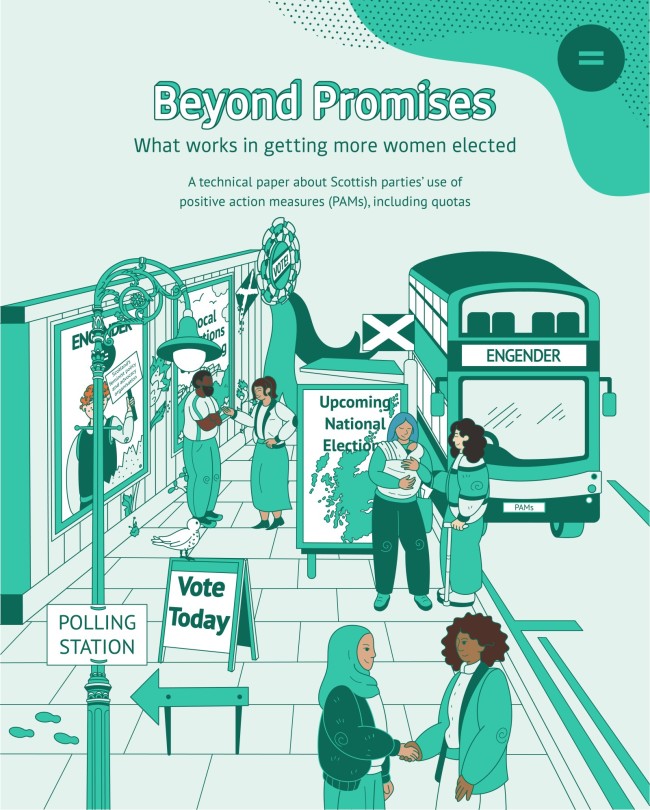
The message is clear: women bring essential perspectives to politics, but they are still being pushed to the margins.
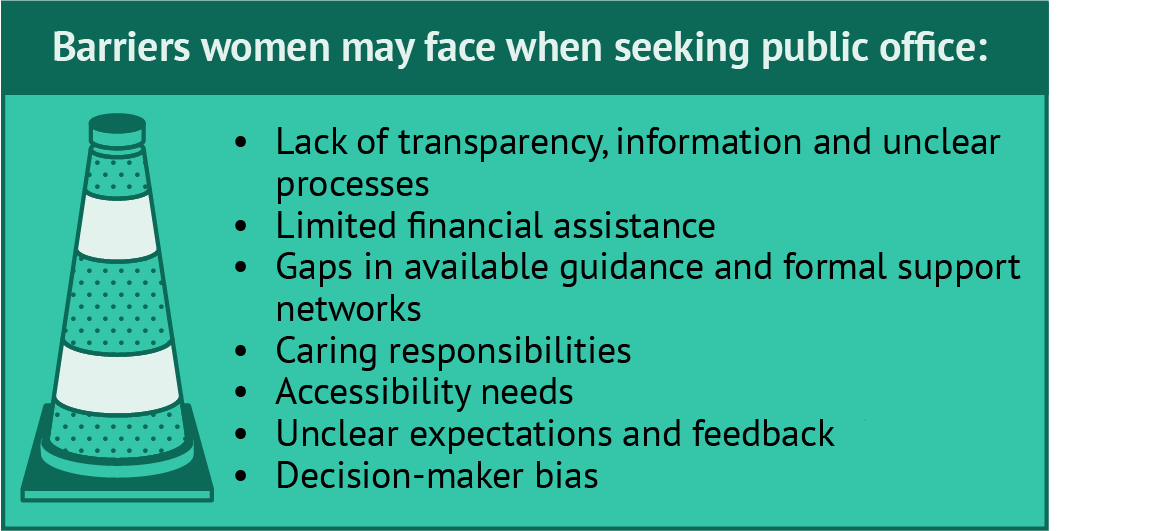 Consistent use of positive action tools leads to better representation, but tokenism, cultural resistance, and lack of intersectionality continue to hold us back. From social media abuse to internal party resistance, the barriers are systemic and deeply entrenched. Yet, women also spoke of passion, purpose, and the drive to make politics better—not just for themselves, but for those who come after.
Consistent use of positive action tools leads to better representation, but tokenism, cultural resistance, and lack of intersectionality continue to hold us back. From social media abuse to internal party resistance, the barriers are systemic and deeply entrenched. Yet, women also spoke of passion, purpose, and the drive to make politics better—not just for themselves, but for those who come after.
Drawing on data from three election cycles (Holyrood 2021, Scottish Local Elections 2022, and UK General Election 2024), alongside survey responses from 159 women and 15 in-depth interviews, the report provides a detailed analysis of how PAMs have shaped women’s political representation in Scotland.
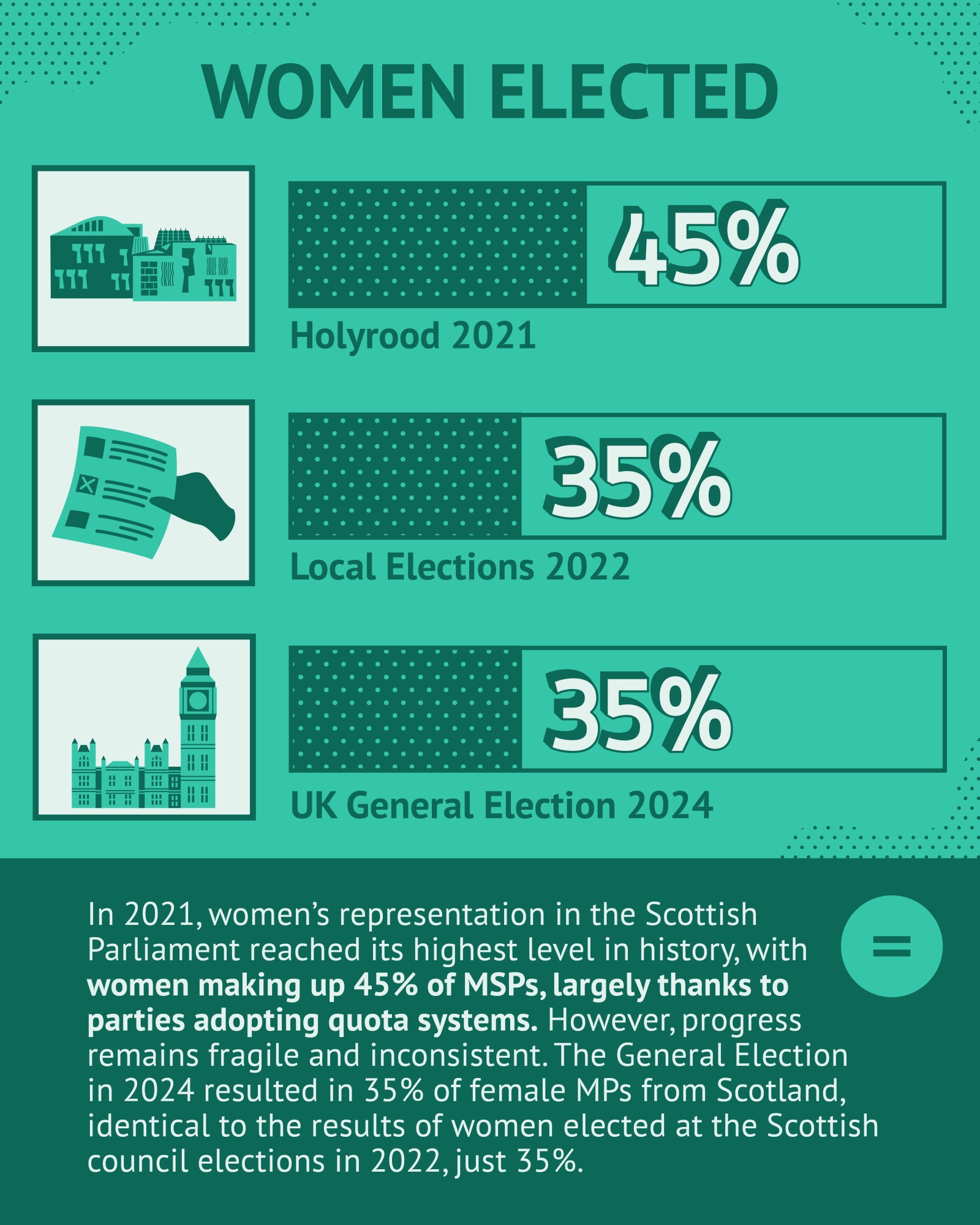 Quotas and PAMs are effective tools: The consistent use of PAMs correlates with higher levels of women’s representation. In 2021, women made up 45% of MSPs - the highest in Scottish Parliament history -largely due to quota use. However, this progress is fragile: women made up only 35% of Scottish MPs in the 2024 General Election and 35% of councillors in 2022, where PAMs were inconsistently applied.
Quotas and PAMs are effective tools: The consistent use of PAMs correlates with higher levels of women’s representation. In 2021, women made up 45% of MSPs - the highest in Scottish Parliament history -largely due to quota use. However, this progress is fragile: women made up only 35% of Scottish MPs in the 2024 General Election and 35% of councillors in 2022, where PAMs were inconsistently applied.
- No party has achieved gender parity across all levels of government, and the underrepresentation of Black and minority ethnic, disabled, and younger women remains stark.
- Inconsistent application of PAMs leads to regression.
- Labour and the Greens have a stronger track record with all-women shortlists, zipping and twinning, but remain inconsistent on a local level.
- The SNP increasingly uses PAMs and has attempted to support disabled and minority ethnic candidates specifically, but the approach is not as consistent as necessary or is often applied in unwinnable seats.
- The Liberal Democrats’ approach to implementing gender-balancing quotas has been mixed. Without a consistent framework, it heavily relies on individual internal champions.
- The Conservatives often demonstrate opposition to quotas. However, some members are critical of this attitude and wish for internal reform.
The evidence is clear: PAMs work, but only when applied consistently, strategically, and with a commitment to intersectionality, focusing on Black and minority ethnic, disabled and young women. Together, we can make politics a place where all women belong.
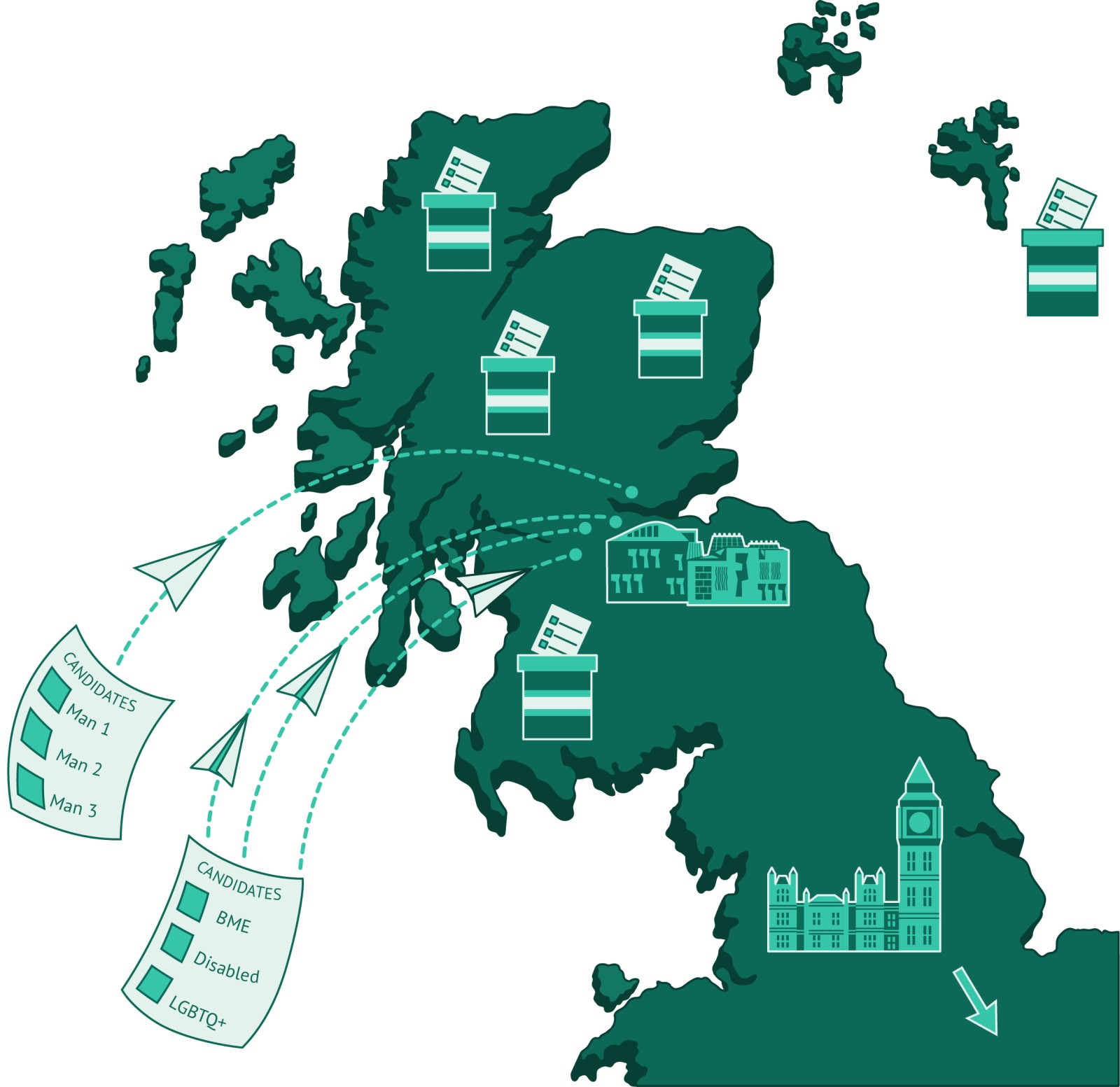 Equal Representation Development Officer Noomi Anyanwu states:
Equal Representation Development Officer Noomi Anyanwu states:
“As Scotland approaches the 2026 and 2027 elections, political parties face a critical opportunity to embed meaningful change. Without action, recent gains risk being reversed.
Some cross-cutting challenges when it comes to the application of positive action measures (PAMS) include tokenistic use of PAMs, cultural resistance within parties to their application, lack of intersectional approaches, the importance of local politics and legal uncertainty.
The women we talked to told us that representation matters. That support networks matter. That visibility matters. And that change is not only necessary—it’s urgent.”
Read the full report including vital recommendations for action here.
Engender statement on the weaponisation of violence against women and girls
-450.png) We are increasingly alarmed at the way women’s rights and safety are being weaponised to demonise minorities across the UK. This kind of distortion of the facts only causes harm to individuals and communities and does nothing to end violence against women and girls.
We are increasingly alarmed at the way women’s rights and safety are being weaponised to demonise minorities across the UK. This kind of distortion of the facts only causes harm to individuals and communities and does nothing to end violence against women and girls.
As Engender, we want to add our voice to calls for action against the spread of hate and misinformation, and for protection and safe and legal routes to be provided for people fleeing war and crisis to the UK. We also want to express our solidarity with racialised and other minority communities who are being made to feel unsafe by hate speech, incitement of violence and far-right protests, including here in Scotland.
Men’s violence against women and girls is endemic in our society and is caused by gender inequality. Spreading inaccurate and hateful rhetoric only generates more violence and creates a distraction from the political commitments that are needed to address it. Improvements to our social security system, investment in childcare, social care, education, housing and community resources, are the things that make a real difference to women.
The false and racist narratives these groups are promoting ignore the fact that violence against women and girls is most commonly perpetrated by someone close to the victim. Last year, the UN reported that the home is the most dangerous place for women, with 60% of women killed by men globally in 2023 dying at the hands of a partner or family member. Two out of every five people arrested during far-right riots in summer 2024 had previously been reported to the police for domestic abuse.
Racism, Islamophobia and anti-migrant attitudes play a major role in the increased risk of violence that women of colour, asylum-seeking and refugee women face.
The UK’s asylum and immigration systems compound this harm, particularly through the brutal No Recourse to Public Funds (NRPF) condition, which increases women’s risk of gender-based violence and restricts access to support, including refuge accommodation.
Invitation to Tender: Equal Representation 2025/26 Candidate Research.
-750.png)
Engender’s Equal Representation in Politics Project aims to help create a Scotland where there is sustainable equal representation of women in all their diversity in politics, ensuring women’s perspectives shape decision-making, reducing gender inequality, and creating better outcomes for women and society.
The project seeks to create change by encouraging all those who hold power to shape the political landscape, including political parties, councils, government, and parliament, to take action to increase the representation of women and improve levels of diversity among women’s representation.
We are seeking a consultant:
- To review and collate a list of women MSPs who have publicly stated that they intend to stand down before the Holyrood 2026 elections.
- To review and collate the reasons given publicly by these MSPs for reaching the decision to stand down.
- To compile a list of candidates for each major party for the Holyrood 2021, broken down by protected characteristic where possible.
- To compile a list of candidates for each major party for the Holyrood 2026, broken down by protected characteristic where possible.
- To create and circulate a survey, and analyse and collate findings, of all women MSPs standing down on the factors that influenced their decision.
The deadline for tenders to be submitted is 5pm, Monday 15th September.
Please find all the details and how to apply, here.
Downloads
 Engender Briefing: Pension Credit Entitlement Changes
From 15 May 2019, new changes will be introduced which will require couples where one partner has reached state pension age and one has not (‘mixed age couples’) to claim universal credit (UC) instead of Pension Credit.
Engender Briefing: Pension Credit Entitlement Changes
From 15 May 2019, new changes will be introduced which will require couples where one partner has reached state pension age and one has not (‘mixed age couples’) to claim universal credit (UC) instead of Pension Credit.
 Engender Parliamentary Briefing: Condemnation of Misogyny, Racism, Harassment and Sexism
Engender welcomes this Scottish Parliament Debate on Condemnation of Misogyny, Racism, Harassment and Sexism and the opportunity to raise awareness of the ways in which women in Scotland’s inequality contributes to gender-based violence.
Engender Parliamentary Briefing: Condemnation of Misogyny, Racism, Harassment and Sexism
Engender welcomes this Scottish Parliament Debate on Condemnation of Misogyny, Racism, Harassment and Sexism and the opportunity to raise awareness of the ways in which women in Scotland’s inequality contributes to gender-based violence.
 Gender Matters in Social Security: Individual Payments of Universal Credit
A paper calling on the Scottish Government to automatically split payments of Universal Credit between couples, once this power is devolved to the Scottish Parliament.
Gender Matters in Social Security: Individual Payments of Universal Credit
A paper calling on the Scottish Government to automatically split payments of Universal Credit between couples, once this power is devolved to the Scottish Parliament.
 Gender Matters Manifesto: Twenty for 2016
This manifesto sets out measures that, with political will, can be taken over the next parliamentary term in pursuit of these goals.
Gender Matters Manifesto: Twenty for 2016
This manifesto sets out measures that, with political will, can be taken over the next parliamentary term in pursuit of these goals.
 Scottish NGO Briefing for UN Special Rapporteur on Violence Against Women
Joint briefing paper for the UN Rapporteur on Violence Against Women.
Scottish NGO Briefing for UN Special Rapporteur on Violence Against Women
Joint briefing paper for the UN Rapporteur on Violence Against Women.

Newsletter
Sign up to receive our newsletter here:
Sign up to our mailing list
Receive key feminist updates direct to your inbox: